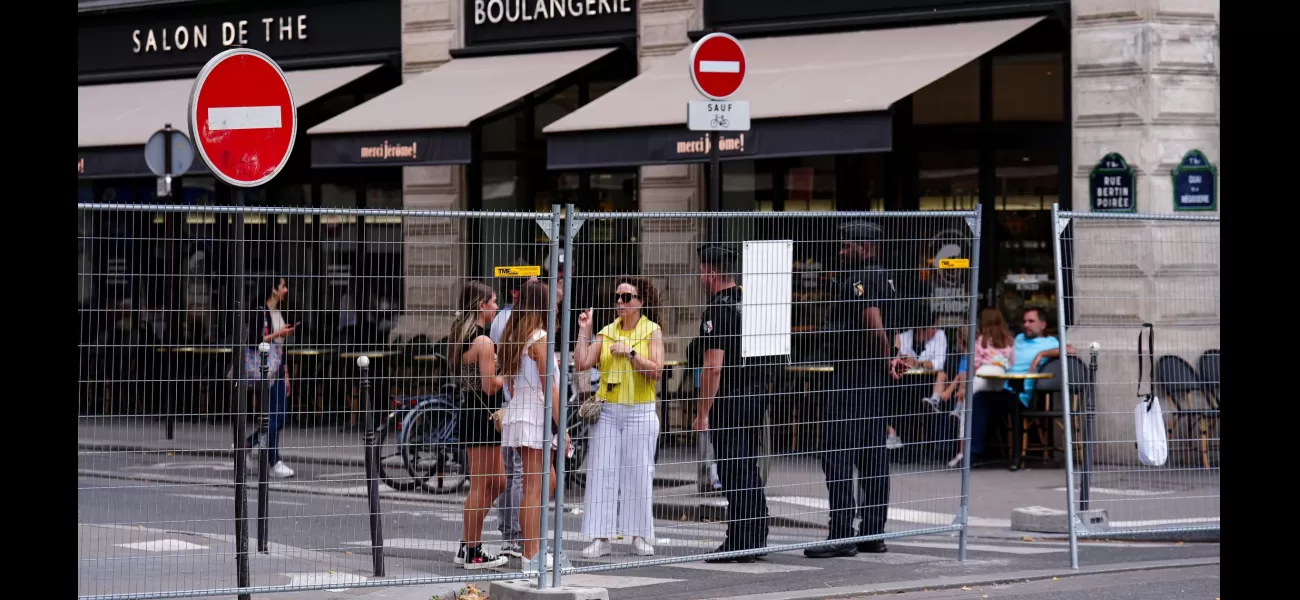Paris is realizing its Olympic aspirations, but the atmosphere resembles that of a prison.
Police are in charge of every part of Paris.
July 24th 2024.

The bustling city of Paris is in a frenzy, preparing for the highly anticipated 2024 Olympic Games. As the opening ceremony draws closer, the streets are filled with a unique buzz of energy and tension. The French government has left no stone unturned in ensuring the safety and security of the city during this major event. The measures taken are almost reminiscent of a dystopian world, with troops deployed from all over France, an advanced AI surveillance system, and sections of the iconic River Seine being barricaded.
For those who do not reside in a bustling metropolis like London, the sight of Paris may seem a bit daunting. Often referred to as the "City of Love," it now resembles a carefully guarded fortress, almost like scenes from the popular book and movie series, "The Hunger Games." Yasmina, the general manager at Hotel Des Ducs D'Anjou, located just a stone's throw away from the famous Louvre Museum, described the city as feeling like a "jail" at the moment. She expressed her concern, stating that there seems to be a constant presence of at least four to five police officers on every street, making her feel uneasy. In her opinion, such a large number of security personnel is a clear indicator of the threat of a potential terrorist attack.
As one arrives at the Gare Du Nord, the main railway station in Paris, there are no signs or flags to indicate that the Olympics are just three days away. However, as one gets closer to the River Seine, the heightened security measures become more apparent, especially around popular tourist attractions like the Eiffel Tower. It was a year ago that Tony Estanguet, the head of the 2024 Olympics Games organizing committee, boldly declared that Paris will be the "safest city in the world" during the event. Looking at the current scenario, his prediction seems to hold true.
A designated "no-go" zone has been established in the heart of the city, almost like an "iron curtain," making it inaccessible for both residents and tourists without a valid QR code. This pass, known as the "Games Pass," grants entry to the designated area, but obtaining one is a complicated process, causing much confusion among visitors. They have been advised to apply for the pass at least a week before their arrival. The barricades were put in place a week before the opening ceremony, much to the surprise of many, resulting in a great deal of frustration.
Mevhibe and Kilian, a couple from Germany on their first trip to Paris, were taken aback by the strict security measures. They were unaware of the Olympics taking place and had no idea about the need for a code to access certain areas of the city. Mevhibe shared her experience, stating that the roadblocks were incredibly annoying, and they were unable to access the River Seine or take a direct route from the Musée d'Orsay to Notre Dame, despite having tickets. Lines of police officers are stationed at the barricades, scanning the QR codes of those wanting to enter. At every crossing, there are people pleading to be allowed through, with little success.
In an interview with The Agency, a police officer stationed outside the Notre Dame, on Île de la Cité, spoke on the condition of anonymity. They revealed that in the last 50 minutes, they had scanned over 200 passes but had only allowed two individuals to enter. In some cases, people are asked to produce additional documentation, such as a pre-booked ticket to a museum, a restaurant reservation, or a hospital appointment. The officer shared that hundreds of people show up daily without a code, unaware of the requirement. Despite the strict rules, the officer admitted to letting some people through, feeling bad for them.
The heavily militarized approach to the Olympics is not without reason. The city of Paris has been shaken by several extremist attacks in the past decade, leaving the nation scarred. In November 2015, a series of coordinated terrorist attacks were carried out in Paris and its suburb of Saint-Denis, resulting in the death of 130 innocent people and injuring over 350 individuals. The Bataclan concert hall, where the American rock band Eagles of Death Metal was performing, was the site of the most horrific bloodshed.
Tensions are running high on the international front as well, with ongoing conflicts in Ukraine and Gaza. The recent violence has also spread to the Israel-Lebanon border. Just a month before the Olympics, a deadly attack was carried out on a concert hall outside Moscow, claiming the lives of at least 145 individuals. The terrorist group, Islamic State, particularly their Afghanistan-based affiliate, Islamic State – Khorasan Province, has called for further violence in Russia and Europe. They have even urged their followers to "recreate the glory" of the 2015 Paris massacre during the Olympics.
Sadly, the Olympics have been the backdrop for several terror attacks and plots in the past. Extremists often use such major events to garner attention and spread their message. The Munich massacre, which took place during the 1972 Summer Olympics in West Germany, claimed the lives of 11 innocent people. The safety and security of the city are of utmost importance, but it is a shame that such measures are necessary to ensure the safety of all those participating in and attending the Olympic Games.
For those who do not reside in a bustling metropolis like London, the sight of Paris may seem a bit daunting. Often referred to as the "City of Love," it now resembles a carefully guarded fortress, almost like scenes from the popular book and movie series, "The Hunger Games." Yasmina, the general manager at Hotel Des Ducs D'Anjou, located just a stone's throw away from the famous Louvre Museum, described the city as feeling like a "jail" at the moment. She expressed her concern, stating that there seems to be a constant presence of at least four to five police officers on every street, making her feel uneasy. In her opinion, such a large number of security personnel is a clear indicator of the threat of a potential terrorist attack.
As one arrives at the Gare Du Nord, the main railway station in Paris, there are no signs or flags to indicate that the Olympics are just three days away. However, as one gets closer to the River Seine, the heightened security measures become more apparent, especially around popular tourist attractions like the Eiffel Tower. It was a year ago that Tony Estanguet, the head of the 2024 Olympics Games organizing committee, boldly declared that Paris will be the "safest city in the world" during the event. Looking at the current scenario, his prediction seems to hold true.
A designated "no-go" zone has been established in the heart of the city, almost like an "iron curtain," making it inaccessible for both residents and tourists without a valid QR code. This pass, known as the "Games Pass," grants entry to the designated area, but obtaining one is a complicated process, causing much confusion among visitors. They have been advised to apply for the pass at least a week before their arrival. The barricades were put in place a week before the opening ceremony, much to the surprise of many, resulting in a great deal of frustration.
Mevhibe and Kilian, a couple from Germany on their first trip to Paris, were taken aback by the strict security measures. They were unaware of the Olympics taking place and had no idea about the need for a code to access certain areas of the city. Mevhibe shared her experience, stating that the roadblocks were incredibly annoying, and they were unable to access the River Seine or take a direct route from the Musée d'Orsay to Notre Dame, despite having tickets. Lines of police officers are stationed at the barricades, scanning the QR codes of those wanting to enter. At every crossing, there are people pleading to be allowed through, with little success.
In an interview with The Agency, a police officer stationed outside the Notre Dame, on Île de la Cité, spoke on the condition of anonymity. They revealed that in the last 50 minutes, they had scanned over 200 passes but had only allowed two individuals to enter. In some cases, people are asked to produce additional documentation, such as a pre-booked ticket to a museum, a restaurant reservation, or a hospital appointment. The officer shared that hundreds of people show up daily without a code, unaware of the requirement. Despite the strict rules, the officer admitted to letting some people through, feeling bad for them.
The heavily militarized approach to the Olympics is not without reason. The city of Paris has been shaken by several extremist attacks in the past decade, leaving the nation scarred. In November 2015, a series of coordinated terrorist attacks were carried out in Paris and its suburb of Saint-Denis, resulting in the death of 130 innocent people and injuring over 350 individuals. The Bataclan concert hall, where the American rock band Eagles of Death Metal was performing, was the site of the most horrific bloodshed.
Tensions are running high on the international front as well, with ongoing conflicts in Ukraine and Gaza. The recent violence has also spread to the Israel-Lebanon border. Just a month before the Olympics, a deadly attack was carried out on a concert hall outside Moscow, claiming the lives of at least 145 individuals. The terrorist group, Islamic State, particularly their Afghanistan-based affiliate, Islamic State – Khorasan Province, has called for further violence in Russia and Europe. They have even urged their followers to "recreate the glory" of the 2015 Paris massacre during the Olympics.
Sadly, the Olympics have been the backdrop for several terror attacks and plots in the past. Extremists often use such major events to garner attention and spread their message. The Munich massacre, which took place during the 1972 Summer Olympics in West Germany, claimed the lives of 11 innocent people. The safety and security of the city are of utmost importance, but it is a shame that such measures are necessary to ensure the safety of all those participating in and attending the Olympic Games.
[This article has been trending online recently and has been generated with AI. Your feed is customized.]
[Generative AI is experimental.]
0
0
Submit Comment





